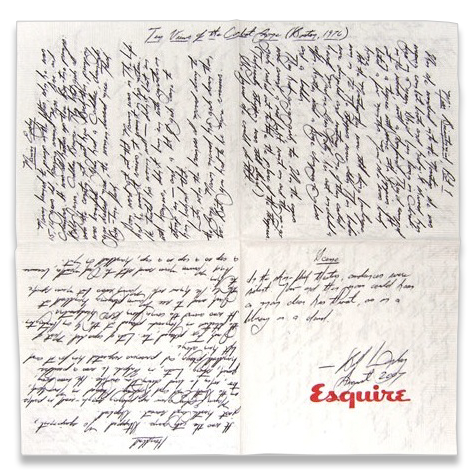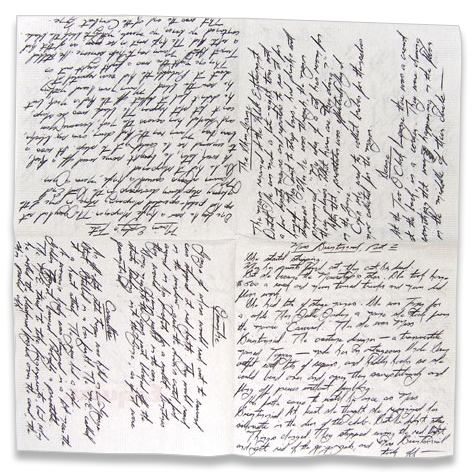

Since it looks like this blog is going to be a permanent thing, I’m going to try to gather up some of my other writing here. I don’t do a lot of writing outside my novels, and what I do is mostly for book publicity. But some of it is worth a second look, I hope.
“Ten Views of the Combat Zone (Boston, 1976)” is a short short story I wrote in 2007 for Esquire magazine’s “napkin fiction project,” which challenged writers to compose a story so short it could fit, hand-written, on a cocktail napkin. The napkins themselves were as interesting as some of the stories (mine is above).
I’ve been fascinated by the Combat Zone, Boston’s notorious old red-light district, for a long time now. I hope to write a novel about is someday soon. I pitched the idea once to my editor, Kate Miciak, as a follow-up to The Strangler. It seemed natural enough to follow a story of Boston’s 1960s crime scene with one set in the epicenter of the city’s 1970s crimeworld, the Combat Zone. Kate didn’t buy it. But we novelists are stubborn as mules when we think we’re onto something good. I’ll try again.
The complete text of the story is after the jump.
Ten Views of the Combat Zone (Boston, 1976)
The author of “The Strangler” writes ten quick noir sketches about Beantown’s once-seedy crime-riddled neighborhood. (January 31, 2008)
Marvin Easley
Marvin learned to pimp in the fifties, when he was 15, 16 years old, hanging around Mass. Ave. and Columbus. It was all hustlers up there. Big-time pimps: Bobby James, Cadillac Brownie. They had girls all over the country, not just here. Back then, pimping was bonafide. You had a Cadillac, diamonds, you dressed nice, the women dressed nice. Flash. Big-time flash.
Soon, word got out that Marvin was in The Life. And he wasn’t vicious, it wasn’t in his nature. He treated his women well — didn’t beat ’em with hangers, didn’t burn ’em with cigarettes or stomp ’em — and a lot of girls came to him behind that.
Later, when the business all moved down to the Zone, Marvin moved his girls down there, too. But you had to be more vicious.
Handball
It was the city game. Stripped. No equipment, just hustle and sweat. Slapball.
Marvin Easley grew up playing single-wall in parks in the South End and Roxbury. Played in New York, too, when he lived down there awhile. He was wiry, quick, strong. Later, in Walpole he was a peerless handball player. Prisoners respected him for it and left him alone.
Jack Fox played, too. Lots of cops did. Most of the detectives in Homicide played at the Y on Huntington. It was around the corner from BPD headquarters.
Jack used to see Marvin playing handball at the Y. He knew who Marvin was but never spoke to him.
And Marvin never said shit to Jack neither, because a cop is a cop is a cop, handball or not.
Miss Bicentennial, Part 1
When she wandered into the Mousetrap, she was wearing combat boots and hadn’t shaved her legs in a year. She’d been living in Colorado, in the woods, with a boyfriend. They’d camped out in a teepee with some other hippies. It lasted a few months. Now she was back home.
At the Mousetrap they were still doing burlesque, even in ’72. The strippers were older. Their bodies were dimpled and watery. One of them called herself Machine Gun Kelly; her act included a coffin. Another one used a huge champagne glass and a ladder.
They had go-go girls, too. When the cops were around, a red light went on and go-go girls rushed out to take the place of the strippers. (Technically stripping was illegal.)
She figured she could do that.
Scene
In the skin-flick theaters, audiences were silent. Now and then you could hear a man clear his throat, as in a library or a church.
Quarantine
Gangs of whores would rush out to surround cars stopped at red lights. They would reach in the windows, grab the driver’s crotch, fish around in his pockets for a wallet. Sometimes they would jump right in the car.
Some nights the cops just blocked off the streets leading into the Zone, as if it were quarantined.
Casualties
An off-duty state trooper was killed on LaGrange Street. Stabbed in a bar fight. The M.E. called it a heart attack. The guy had a wife.
A woman’s body was dumped in a lot near the Golden Nugget, burned. Probably a prostitute. The M.E. tried to take fingerprints, but when he rolled the blackened fingers over the card, the skin peeled off.
Miss Bicentennial, Part 2
She shaved her legs and started stripping. When her parents found out, they cut her dead.
She became the Mousetrap’s star. She took home $500 a week and never turned tricks and never did floor work.
She had lots of stage names. She was Foxy for a while. Then Julie Jordan, a name she took from the movie “Carousel.” Then she was Miss Bicentennial. The costume designer — a transvestite named Topaz — made her an outrageous Uncle Sam outfit with lots of sequins, and hidden hooks so she could bend over and open them surreptitiously and fling off pieces without fumbling.
Her father came to watch her once as Miss Bicentennial. At least she thought she recognized his silhouette in the door of the club. But he didn’t stay.
Things changed. They stopped using the red light and got rid of the go-go girls, and Miss Bicentennial took off.
Marvin Easley’s Fate
One day he saw a knife sharpener. The guy had set up his pedal-operated sharpening stone in one of the gloomy step-down doorways in the South End. Marvin always carried a knife, never a gun. So he had it sharpened.
A week later, he bought some weed off a kid, to unwind so he could get to sleep. It was a burn bag. Marvin ran the kid down, over six blocks, and slashed him across the neck, because you can’t let shit happen. The blade was so sharp, he didn’t feel it deflect off the kid’s neck, but he saw the blood. Marvin never heard nothing about it. Probably the kid never reported it.
Then one night there was a fight right out on Tremont Street. Marvin ran to help someone. He stabbed a white kid. The knife went in so easy, as if that kid contained no bones, no muscle, nothing to block the blade.
That was the end of the Combat Zone.
The Skin Game
The mayor renamed it the “Adult Entertainment District.” He even made a late-night tour with a few deputy mayors and reporters to see it for himself. They went to strip bars, had drinks with the strippers. When he was through, the mayor pronounced, “My idea of a city has room for these places. What harm are they doing?”
After that, prostitution was effectively legal in the Zone.
Cops who used to collect bribes for themselves now collected for the mayor.
Scene
At the Two O’Clock Lounge there was a crowd at the back, in a corner. They were cheering something that was happening on the floor in the middle of their circle.